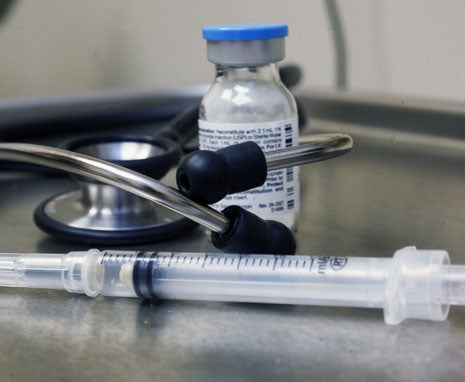The Centers for Medicare and Medicaid Services Office of the Actuary (OACT) just released its projections for national health spending through 2021. The picture isn’t pretty, as health spending will continue to increase at a much faster rate than the gross domestic product (GDP), consuming 19.6 percent (almost one-fifth) of the nation’s economy in 2021.
Growth in health spending will remain modest until 2014, when Obamacare expands Medicaid to an additional 19.6 million Americans and creates exchanges to regulate private insurance and administer new federal subsidies. Once these changes go into effect, Medicaid spending will increase by 18 percent, and private health insurance spending will increase by 7.9 percent, since more people will gain coverage through the government-run exchanges. According to OACT, “Together, Medicaid and private health insurance spending contribute to an overall acceleration in projected national health spending growth to 7.4 percent, which is 2.1 percentage points faster than would be expected in the absence of health reform.”
The Daily Signal depends on the support of readers like you. Donate now
The Obama Administration clearly chose to wear rose-tinted glasses to interpret the projections. In an interesting twist on the CMS report, Secretary of Health and Human Services (HHS) Kathleen Sebelius touts “No increase in national health spending as a percent of GDP for five years.” But the Secretary backdates the projections, going on to say, “From 2009 through 2013, national health spending will not increase as a percent of the economy.” Of course, she knows that the major provisions of Obamacare don’t begin until 2014.
In addition, OACT attributes slow growth in health spending between 2009 and 2013 to the poor economic climate, not Obamacare. They explain, “The sustained effects of the recent recession and modest recovery on projected growth in disposable personal income, insurance coverage, and unemployment rates are expected to continue to dampen health spending growth through 2013, much as they affected spending in 2008–10.”
Obamacare’s expansion of government’s role in health care will be expensive and significantly increase government’s share of spending. CMS projects, “By 2021, federal, state, and local government health care spending is projected to be nearly 50 percent of national health expenditures, up from 46 percent in 2011, with federal spending accounting for about two-thirds of the total government share.”
Sebelius attempts to respond to Obamacare critics, writing, “Today’s report found that the Affordable Care Act [Obamacare] did not result in increased health care costs. In fact, the report showed a slight decrease in costs in 2011.” It bears repeating: Obamacare’s main provisions don’t begin until 2014. The report shows that Obamacare will actually “add about $478 billion in cumulative health spending” through 2021.
Instead of playing games with dates and numbers, the Obama Administration should recognize the simple fact that Obamacare doesn’t reduce health spending—it does the opposite.





























